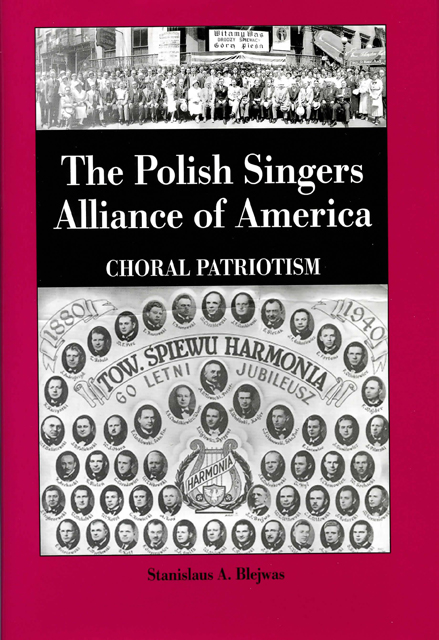Book contents
- Frontmatter
- Contents
- List of Illustrations
- Foreword
- Acknowledgments
- Introduction
- 1 “To Sing Out the Future of Our Beloved Fatherland”
- 2 Pieśni o ziemi naszej (Songs of Our Land)
- 3 The Convention of “Unhappy Memory”
- 4 “Active Duty”
- 5 “Cultural Care”
- 6 World War II and a New Immigration
- 7 The Czechlewski Years: The Ideological Organization Redefined
- 8 Polish American Choral Culture
- 9 “Let Poland Be Poland!”
- 10 Quo Vadis Polish Song in North America?
- Appendix A PSAA National Officers
- Appendix B National Conventions
- Appendix C Individual Choirs
- Appendix D Honorary Members
- Appendix E Compositions of Antoni Małłek Celebrating the Holy Trinity Immigrant Neighborhood in Chicago
- Appendix F Membership
- Appendix G Hlond Trophy Winners
- Appendix H Children’s Choirs
- Appendix I Selected Biographies
- Appendix J Competition Songs, Winning Choirs, and Free Selection at National Conventions of the Polish Singers Alliance of America
- Appendix K Guest Artists and Selections Performed at National and International Conventions of the Polish Singers Alliance of America, 1905–1998
- Appendix L Songs Sung by Choirs at Concerts of the National and International Conventions of the Polish Singers Alliance of America
- Appendix M PSAA Districts and Choirs—1999
- Notes
- Bibliography
- Index
10 - Quo Vadis Polish Song in North America?
Published online by Cambridge University Press: 17 March 2023
- Frontmatter
- Contents
- List of Illustrations
- Foreword
- Acknowledgments
- Introduction
- 1 “To Sing Out the Future of Our Beloved Fatherland”
- 2 Pieśni o ziemi naszej (Songs of Our Land)
- 3 The Convention of “Unhappy Memory”
- 4 “Active Duty”
- 5 “Cultural Care”
- 6 World War II and a New Immigration
- 7 The Czechlewski Years: The Ideological Organization Redefined
- 8 Polish American Choral Culture
- 9 “Let Poland Be Poland!”
- 10 Quo Vadis Polish Song in North America?
- Appendix A PSAA National Officers
- Appendix B National Conventions
- Appendix C Individual Choirs
- Appendix D Honorary Members
- Appendix E Compositions of Antoni Małłek Celebrating the Holy Trinity Immigrant Neighborhood in Chicago
- Appendix F Membership
- Appendix G Hlond Trophy Winners
- Appendix H Children’s Choirs
- Appendix I Selected Biographies
- Appendix J Competition Songs, Winning Choirs, and Free Selection at National Conventions of the Polish Singers Alliance of America
- Appendix K Guest Artists and Selections Performed at National and International Conventions of the Polish Singers Alliance of America, 1905–1998
- Appendix L Songs Sung by Choirs at Concerts of the National and International Conventions of the Polish Singers Alliance of America
- Appendix M PSAA Districts and Choirs—1999
- Notes
- Bibliography
- Index
Summary
The decade since 1989 is a new era in Polish American relations. It opened with the collapse of communism in Eastern Europe, and culminated in 1999 with the entry of Poland, the Czech Republic, and Hungary into the North Atlantic Treaty Organization. When Prime Minister Jerzy Buzek visited the United States in July 1998, just two months after the United States Senate ratified NATO expansion, he was greeted by President William Clinton as the leader of “America's newest ally.” The Polish diaspora's dream for an independent and secure Poland was in its grasp. For two centuries the diaspora kept “the Polish question” before the West. The opening refrain of the Polish national anthem, “Poland is not lost as long as we live,” possesses a powerful meaning for Poles at home and in the diaspora. Homeland politics was an element that defined Polonia communities, and in Polonia as in Poland, the arts served the cause of independence. For a century, homeland politics and national aspirations shaped the Polish Singers Alliance as an ideological organization. For eighty of the one hundred years, from 1889 to 1918 and from 1939 to 1989, the ideological struggle was political, for a free Poland. Only in the inter-war years, when there was a free Poland, did American Polonia organizations pursue ideological work for different reasons. Americanization, assimilation, and restrictive immigration laws raised questions about whether the original immigrant community was viable, and what American Polonia would look like as the second and succeeding Americanized generations emerged. The cultural struggle attempted to limit the losses to Americanization and to maximize the native heritage through its preservation and propagation.
The original immigrants have passed on, and their descendants are properly Americans of Polish origin. Since 1939, smaller waves of political émigrés, soldier exiles, displaced persons, consumer immigrants, and a Solidarity immigration have arrived. Contemporary American Polonia embraces the generational descendants of first immigrants, and the newer immigrants. Advances in technology and communication, which make contact with Poland instantaneous, and profound political and economic changes in Eastern Europe, raise questions about the Diaspora's future role.
- Type
- Chapter
- Information
- The Polish Singers Alliance of America 1888-1998Choral Patriotism, pp. 173 - 186Publisher: Boydell & BrewerPrint publication year: 2005



